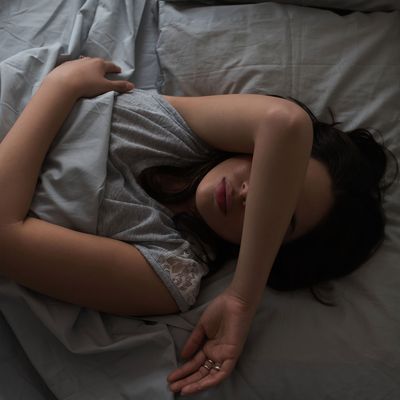
Doctors agree: Women have a harder time sleeping than men. There is a laundry list of reasons why, and chief among them is your own dang body making things harder for you thanks to hormone fluctuations. But isn’t one of the virtues of the birth-control pill the fact that it levels hormonal mountains into molehills? Should everybody be on the pill to sleep better? Not so fast.
First, let’s talk about what happens when you’re not on the pill. Your levels of estrogen and progesterone not only dictate when an egg is released, but they also have an impact on your core temperature. If you’ve ever tried the form of natural family planning that involves obsessive tracking of basal body temperature and cervical mucus, this will sound familiar — your temperature is going to be higher during certain times of the month.
Biology rehash: The start of your period is considered day one of your cycle. Another egg will be released about halfway through your cycle, at which point the hormone progesterone spikes up and will stay elevated until a few days before your next period, says Ari Shechter, PhD, assistant professor of medicine at Columbia University Medical Center. This is known as the luteal or premenstrual phase, during which women’s temperatures are about one-half to one degree higher than during the rest of the month, even at night.
This could affect sleep quality, Shechter says, since core body temperature is connected to sleep. Our temperature is high during the day, declines before we go to bed, and hits its lowest point overnight. One degree isn’t a huge difference, but it’s noticeable, he says. “Maybe it can affect some of the subjective feelings. If you’re feeling hot, you might feel a little more restless.”
Sure enough, many women say they sleep worse the week before their period arrives compared to other times, says Fiona Baker, PhD, senior program director of Human Sleep Research at SRI International. Baker says it’s possible that higher body temps during the premenstrual phase could contribute to sleep disturbances, but, really, your hormones could be acting directly on sleep regulatory centers in the brain — it’s just not clear. There’s also the possibility that hellish cramps could be keeping you awake.
Shechter offers an alternate theory, based on a study he worked on: Women may be getting less R.E.M. sleep during the premenstrual phase compared to the first half of their cycles, specifically less of it around five in the morning. Normally, people have longer and longer R.E.M. episodes as their sleep progresses, and some think it’s because this type of sleep gets your brain ready for being awake.
If you have less R.E.M. shortly before waking up, it’s possible that you’ll experience sleep inertia, or extended grogginess. “That might cause you to reflect back and say, ‘I feel terrible, that was a very bad sleep,’” he says. “You might rate your overall quality of sleep as poor,” when it may have been just fine, aside from the R.E.M. bit. Again, just a theory.
The pill sidesteps all of these problems, right? It depends. Baker has done sleep studies with women taking combined oral contraceptives (a.k.a. a combo of estrogen and progestin, synthetic progesterone) and observed that, compared to a control group, women on the pill had less deep, slow-wave sleep. The hormones do impact sleep structure, but it’s not known if the changes affect how these women feel when they’re awake, she says. They may not notice it at all.
And being on the pill is kind of like having an extended luteal phase, for better or for worse, Shechter says. Baker agrees: “Their body temperatures are similar to women in the natural luteal phase (after ovulation) throughout the three-week active pill cycle.” Baker adds that women’s temperatures stay elevated for the first two to three days of the placebo.
Though there are some women who might find they sleep better on the pill, she says. For instance, the pill might knock out bloating or shorten their period altogether. “Some women may notice a more stable sleep pattern across the month because of taking oral contraceptives, and not having the fluctuations in the hormones, but that has not been studied.”
The bottom line: Crappy sleep probably isn’t a reason to change pills (or go on one in the first place), but it’s something to be aware of. And don’t forget that kicking one of your feet on top of the covers might be the ultimate sleep hack.




